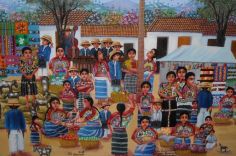Print  |
|


Society issues

Environment and livelihood
The Chinese at Lake Oguemoue
In the midst of our field sessions our crew sometimes unexpectedly captures unusual encounters, uncommon scenes and “slices of life”. This video is one of those improvised moments: Théodosie, member of the Akele community near Lambarene (Gabon), watches a huge tugboat full of wood sliding by on the lake. And she starts on the presence of the Chinese in the area…
More info here
Linguist: Jean-Marie Hombert
Camera and sound: Luc-Henri Fage
Translation: Hugues Awanhet
Editing : Caroline Laurent
Threats upon the turtles
More info here
Sand dollars
More info here
Crab fishing in the mangrove
More info here
Linguist: Patrick Mouguiama-Daouda
Image & sound: Muriel Lutz
Editing: Caroline Laurent
Surviving in the mountain, with Marcel Até
Marcel Até recounts life as it used to be, in the Xârâcùù language of New Caledonia: a life of hard work based on the harvest of coffee, citrus fruit, and taro, products that needed to be carried across the mountains on foot. Then came the pesticides, and what’s more, the fire ant, a strongly urticating kind of ant that made harvest by hand impossible. Consequence of such curses, livelihood grew scarce…
Linguist: Claire Moyse-Faurie (LACITO/CNRS)
Image & sound: José Reynes, assisted by Karl Jorédié
Translation: Annick Kasovimoin (Académie des Langues Kanak – ALK)
Editing: Caroline Laurent
Mariage and its side issues
To start off the summer, Sorosoro kicks off a whole new series of videos filmed a year ago in the Gabonese Akele community, devoted to the theme of marriage… and its possible side issues: footage raising questions as diverse as the choice of partners, proposal procedures, cost of dowry, rules regarding polygamy, adultery or widowhood.
These interviews may bear a few surprises, at least for the most Western-framed. But basically what we’ll see is that there’s a politico-economic aspect to marriage in the Akele community, as in most African communities: marriages structure society, and involve property transfer. Which incidentally reminds that marriages arranged in the same perspectives in remote parts of Western Europe do not necessarily belong to a very distant past…
Equally perceptible in the interviews, the young generations, as always, tend to wish for different lifestyles than their parents and grandparents. Africa is also undergoing the big tradition shake-up…
Akele marriage, by Jean kédine
The first of this series on marriage shines the light on the different changes in matrimonial customs of the contemporary Akele community, especially in regards to the choice of a partner…
More info here
The « proposal », by Théodosie
Théodosie tells us here about a key step in the ritual of matrimonial union in her community: the traditional kidnapping of the future spouse by the husband’s family.
More info here
The dowry, by Anaaket & Jean Kédine
Our summer series on marriage continues with a new episode focusing on a key institution in several traditional societies : the bride’s dowry.
More info here
The dowry, by Papa Kédine
Another account on dowry, under quite a different light…
More info here
Polygamy, by Jean Kédine
Another side of Akele marriage, with this new video on the question of polygamy.
More info here
Adultery, by Jean kédine
Sorosoro continues its exploration into the marital relationships of Gabon. The following video covers a practically universal topic, which definitely does not lack in excitement…
More info here
Birth and rites of passage, with Papa Kédine
After the marriage proposal, the dowry, polygamy and adultery, another pivotal moment in life: childbirth.
More info here
Circumcision, with Jean Kédine
Moving on in our exploration of the rites related to circumcision: following Papa Kédine last week, his grandson Jean brings us details on the ceremony and the actual operation as they used to be conducted.
More info here
Widowhood
The time has come to bring our series on marriage to a close, with this last video, obviously, on death and widowhood.
More info here
Linguist: Jean-Marie Hombert
Camera and sound: Luc-Henri Fage
Translation: Hugues Awanhet
Editing : Caroline Laurent








